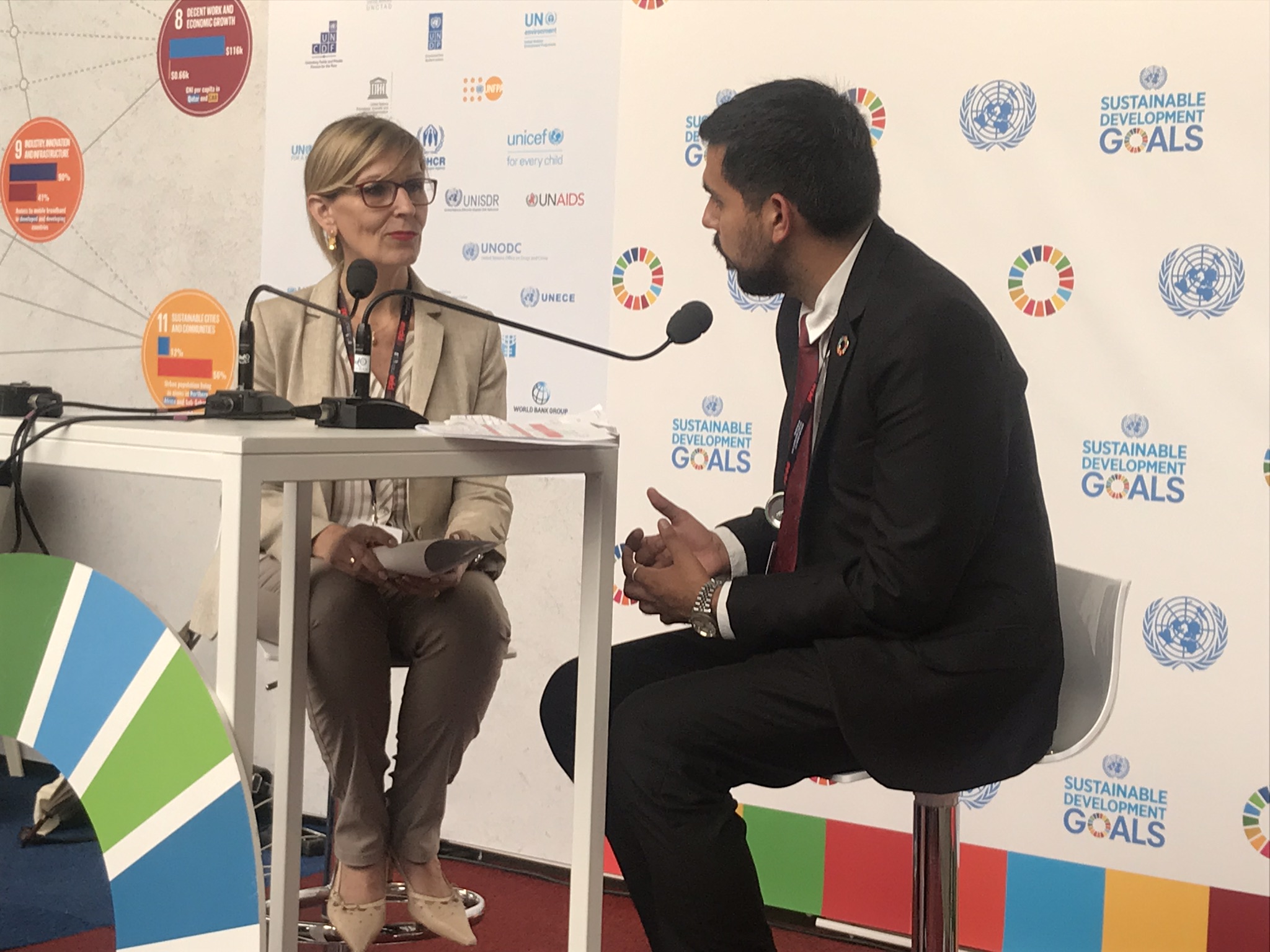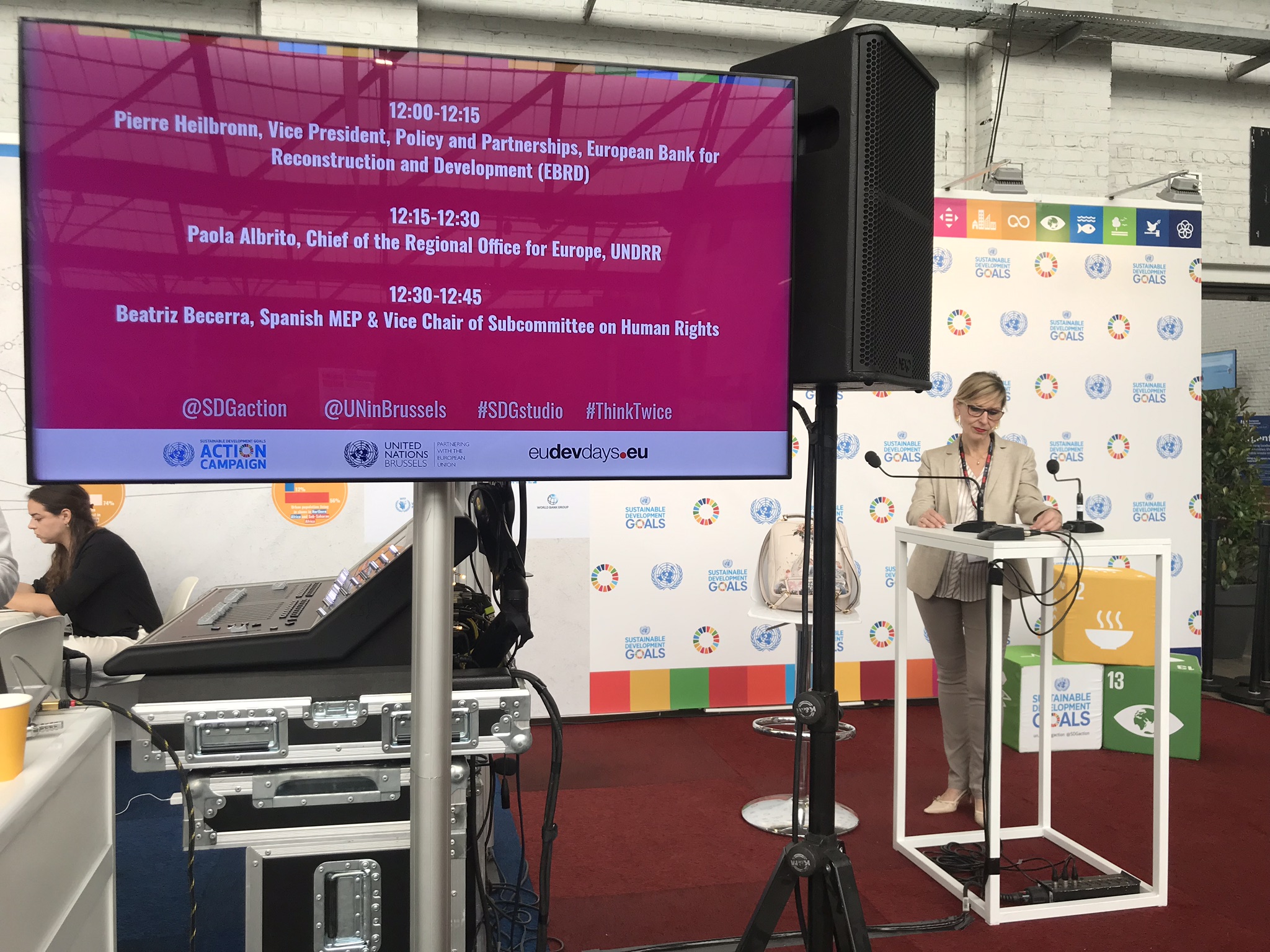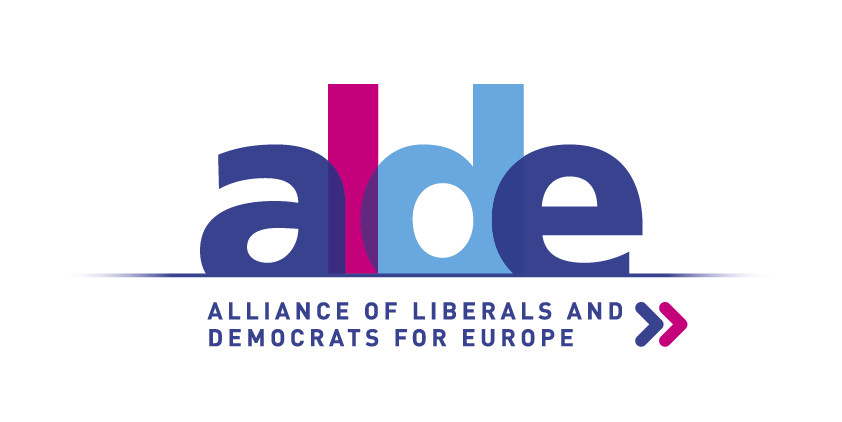
20 Jun Beatriz Becerra en los European Development Days 2019: «La principal causa de desigualdad sigue siendo el lugar de nacimiento»
El 18 y 19 de junio tuvieron lugar en el Parlamento Europeo los European Development Days de 2019. En esta ocasión, el título que daba contexto al evento era Addressing inequalities: Building a world which leaves no one behind (Afrontando las desigualdades: Construyendo un mundo que no deje a nadie atrás) y con el lema #ThinkTwice (vuelve a pensar). El día 19, Beatriz Becerra fue entrevistada como vicepresidenta de la subomisión de Derechos Humanos del Parlamento Europeo.

Cuando piensas en el desafío de las desigualdades hoy, ¿qué te viene a la mente?
Pienso en lo mucho que queda por hacer, en lo que ya se ha conseguido y en la posibilidad de perderlo. La desigualdad sigue siendo, sobre todo, una cuestión de nacimiento. Si naces en un país rico tendrás muchas más oportunidades que si naces en uno pobre. Gracias al comercio y a la extensión de la democracia, la pobreza se ha reducido en las últimas décadas de una forma que no podríamos ni haber imaginado. Cientos de millones de personas en China, la India, en algunas regiones de América Latina y de África han salido de la pobreza extrema, pero algunos de estos logros pueden estar en riesgo por la política hostil y proteccionista que está impulsando Donald Trump.
Por supuesto, sigue existiendo una desigualdad de género en todo el mundo, que también estamos en proceso de solucionar. Sigue habiendo una brecha salarial, una brecha en posiciones de poder, una brecha en violencia. Pero lo más grave ocurre cuando se unen los dos factores: una mujer que nace en un país pobre lo tiene muy difícil. Y si además tiene un régimen que no la considera ciudadana (como en Irán o en Arabia Saudí), entonces encontramos los casos más graves.
¿Cuáles son los principales desafíos globales que tenemos delante de nosotros y de nuestro planeta?
Entre los que conocemos mencionaría el cambio climático, el futuro del trabajo en tiempos de la inteligencia artificial, la desigualdad de género, el sostenimiento de los sistemas de bienestar en Occidente… Pero hay dos que me interesan especialmente y que están relacionados entre ellos.
Uno es la desinformación, un fenómeno muy antiguo pero que ha renacido por el cambio tecnológico y la aparición de las redes sociales. Cuando fuimos conscientes de lo que se estaba haciendo desde Rusia y desde otros países, lo vivimos como un problema de seguridad nacional o europea. Y lo es, pero también es un ataque contra las bases de la democracia liberal. No persigue difundir mentiras, sino que la gente pierda la fe en el concepto de verdad, que dejen de importarle los hechos. Y esto es gravísimo, porque convierte los procesos democráticos en simples mecanismos para la asignación del poder, en los que lo bueno y lo malo no tienen lugar, como tampoco lo tiene la realidad. Celebro que la UE haya tomado las riendas con un Plan Contra la Desinformación que ha funcionado bastante bien en las últimas elecciones europeas, pero el desafío está muy lejos de haber terminado.
El otro gran desafío tiene que ver con la preponderancia de la democracia liberal y del orden multilateral. El auge de China ofrece al mundo un modelo que promete prosperidad sin libertad, orden sin derechos. Por otra parte, el giro proteccionista y agresivo de Estados Unidos cuestiona las viejas alianzas de la posguerra y el orden internacional que de él surgió. Y esto es importante porque este orden se basaba en principios liberales y en los Derechos Humanos. La desinformación es un arma importante de los nuevos autoritarios, de Moscú a Caracas pasando por Estambul. Frente a ellos, la Unión Europea podría ser un ejemplo de alternativa global, democrática, liberal y multilateral, un ejemplo de libertad y prosperidad. Pero para ello necesitamos reformas que nos den la capacidad que merecemos y nos permitan asumir el papel que nos corresponde.
¿Por qué son importantes el multilateralismo y las alianzas globales para abordarlos?
Porque han permitido que la prosperidad y la paz ganen terreno desde la mitad del siglo XX. A pesar de todas las noticias negativas que vemos cada día, la pobreza se ha reducido de forma muy importante, la violencia también, la educación ha avanzado, hay más acceso a recursos básicos… Y en todo esto ha tenido un papel importante el conjunto de instituciones multilaterales, incluidos los tratados y acuerdos de todo tipo, desde Derechos Humanos hasta libre comercio. Por supuesto, el mejor ejemplo es la Unión Europea, un logro impresionante a pesar de todas sus imperfecciones y de la frustración que nos ocasiona su funcionamiento.
La cuestión es cómo vemos el mundo. Podemos verlo como un lugar en lucha, como un juego de suma cero donde lo que uno gana lo pierde otro. O podemos verlo como un lugar en el que hay lugar para la competición pero también para la cooperación, y en la que se pueden controlar riesgos y repartir ganancias entre todos. No es un mundo ideal, pero es un mundo posible, lo hemos conocido y debemos protegerlo.
¿Qué hay que hacer para asegurar una acción global?
El orden multilateral necesita que lo defiendan en estos momentos de ataque, necesita abogados que recuerden lo mucho que puede beneficiar a todos. Debemos ir a los hechos, a los datos, y no permitir que cundan mentiras como las que condujeron al resultado del referéndum del brexit. Necesitamos combatir la desinformación y necesitamos liderazgos comprometidos con la verdad.
Debemos implicar en este orden multilateral a toda la sociedad: empresas, asociaciones, jóvenes… Tenemos que explicarles lo que es la Organización Mundial de la Salud, o la de Comercio, o, por supuesto, la UE. También la importancia de la Declaración de Derechos Humanos, o la Carta Europea de Derechos Fundamentales. Es importante que conozcan la historia, no estoy de acuerdo con los que dicen que a los jóvenes hay que hablarles del futuro y no del pasado. Es imposible hacer lo primero sin explicar lo segundo.
Y, en particular, la Unión Europea tiene que reformarse para poder ejercer el liderazgo para el que está llamada. Sólo nosotros podemos encabezar la defensa del orden multilateral, sólo nosotros podemos vincular nuestros intereses (que los tenemos y no hay que negarlos) con los valores liberales que hicieron posible el mayor periodo de prosperidad de la historia.
English version
When you think about the challenge of inequalities today, what comes to your mind?
I think about how much remains to be done, what has already been achieved and the possibility of losing it. Inequality remains, above all, a matter of birth. If you are born in a rich country you will have many more opportunities than if you are born in a poor one. Thanks to trade and the extension of democracy, poverty has been reduced in recent decades in a way that we could not have even imagined. Hundreds of millions of people in China, India, some regions of Latin America and Africa have come out of extreme poverty, but some of these achievements may be at risk because of the hostile and protectionist policy promoted by Donald Trump.
Of course, there is still a gender inequality throughout the world, which we are also in the process of solving. There is still a wage gap, women continue to earn between 31 and 75% less than men do, a gap in positions of power, a gap in violence. But the most serious thing happens when the two factors come together: a woman who is born in a poor country has it very difficult. And if she also lives in a regime which does not consider her a citizen (as in Iran or in Saudi Arabia), then we find the most serious cases.
What are the key global challenges lying ahead of us and our planet?
Among those we know, I would mention climate change, the future of work in times of artificial intelligence, gender inequality, the maintenance of welfare systems in the West … But there are two for which I am particularly interested in and that are related to each other.
One is disinformation, a very old phenomenon that has been reborn due to technological change and the appearance of social networks. When we were aware of what was being done from Russia and from other countries, we experienced it as a national or European security problem. And it is, but it is also an attack against the foundations of liberal democracy. It does not seek to spread lies, but to make people lose faith in the concept of truth and stop caring about the facts. And this is very serious, because it converts democratic processes into simple mechanisms for the allocation of power, in which good and bad do not take place, just as reality does not. I am glad that the EU has taken the reins with a Plan Against Disinformation that has worked quite well in the last European elections, but the challenge is far from over.
The other great challenge has to do with the prevalence of liberal democracy and the multilateral order. The rise of China offers the world a model that promises prosperity without freedom, order without rights. On the other hand, the protectionist and aggressive turn of the United States questions the old alliances of the postwar period and the international order that arose from it. And this is important because this order was based on liberal principles and Human Rights. Disinformation is an important weapon of the new authoritarians, from Moscow to Caracas passing through Istanbul. In front of them, the European Union could be an example of a global, democratic, liberal and multilateral alternative, an example of freedom and prosperity. But for this we need reforms that give us the capacity we deserve and allow us to assume the role that corresponds to us.
Why are multilateralism and global partnerships important to address them?
Because they have allowed prosperity and peace to gain ground since the mid-twentieth century. Despite all the negative news that we see every day, poverty has been reduced in a very important way, violence too, education has advanced, there is more access to basic resources … And in all this the group of multilateral institutions have had an important role, including treaties and agreements of all kinds, from Human Rights to free trade. Of course, the best example is the European Union, an impressive achievement despite all its imperfections and the frustration that have caused sometimes us by its functioning.
The question is how we see the world. We can see it as a place in struggle, as a zero-sum game where what one wins is lost by another. Or we can see it as a place where there is room for competition but also for cooperation, and in which risks can be controlled and profits shared among all. It is not an ideal world, but it is a possible world, we have known it and we must protect it.
What needs to be done to ensure global action?
The multilateral order needs to be defended in these moments of attack, it needs lawyers who remember how much it can benefit everyone. We must go to the facts, to the data, and do not allow the spread of lies such as those that led to the result of the Brexit referendum. We need to combat disinformation and we need leaders committed to the truth.
We must involve the entire society in this multilateral order: companies, associations, young people … We have to explain them what the World Health Organization is, or that of Trade, or, of course, the EU. Also the importance of the Declaration of Human Rights, or the European Charter of Fundamental Rights. It is important that they know the story, I do not agree with those who say that with young people we should talk about the future and not the past. It is impossible to do the first without explaining the second.
And, in particular, the European Union must reform itself in order to exercise the leadership for which it is called. Only we can lead the defense of the multilateral order, only we can link our interests (which we have and should not deny) with the liberal values that made possible the greatest period of prosperity in history.


